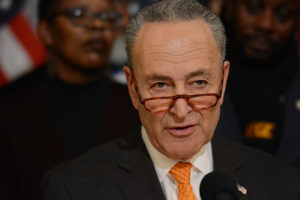The Senate on Tuesday evening passed a bipartisan bill to invest $250 billion toward technology research and development efforts to better compete with China, to include more than $50 billion aimed at bolstering domestic semiconductor production.
Senate Majority Leader Chuck Schumer (D-N.Y.), who co-sponsored the U.S. Innovation and Competition Act
(USICA) along with Sen. Todd Young (R-Ind.), urged the House on Wednesday to consider the legislation quickly, while companion legislation has yet to advance and a pair of separate bills have been introduced out of two House committees.

“Now that the bill has passed the Senate, we are going to work with Speaker Pelosi and the relevant committee chairs in the House to move this bill forward as quickly as possible. Of course, the House could bring in additional priorities, but I am intent on seeing the major thrust of this legislation become law. The bill is so important to the future of America that the House and Senate must come together and send President Biden a bill that he is very, very eager to sign,” Schumer said during floor remarks on Wednesday.
President Joe Biden released a statement in favor of the bill’s passage, while Secretary of Commerce Gina M. Raimondo also urged the House to consider the legislation “as quickly as possible.”
“It will empower us to discover, build, and enhance tomorrow’s most vital technologies — from artificial intelligence, to computer chips, to the lithium batteries used in smart devices and electric vehicles — right here in the United States. By strengthening our innovation infrastructure, we can lay the foundation for the next generation of American jobs and American leadership in manufacturing and technology,” Biden wrote in a statement.
The USICA (S. 1260) was approved by 68-32 vote, with Sen. Bernie Sanders (I-Vt.) joining a group of GOP lawmakers in voting against the measure.
Sen. Jim Inhofe (R-Okla.), the Senate Armed Services Committee ranking member, criticized the bill for inadequate defense spending provisions, while Sen. Richard Burr (R-N.C.) raised a concern over a lack of specificity for intellectual property protection measures.
“Choosing between technology and military priorities when it comes to competition with China is a false choice. The strongest signal we can send to deter China is by competing on all levels: in technological innovation, in domestic manufacturing and in providing resources to our military to create the strongest military deterrent possible. This legislation is incomplete without adequate defense funding and I cannot support it,” Inhofe said in a statement.
The USICA authorizes $81 billion for the National Science Foundation to work on areas such as artificial intelligence, quantum computing and robotics over the next few years, to include allocating $29 billion for a new Technology and Innovation Directorate that would have “DARPA-like authorities” to help advance research and development efforts.
The bill also specifically includes $17.5 billion to advance Defense Advanced Research Projects Agency (DARPA) advanced technology research programs at the Pentagon and $10 billion to the Department of Commerce to help establish regional tech hubs over the next five years.
A critical piece to the USICA is the inclusion of the CHIPS Act, which would authorize $52 billion to address the microchip shortage and improve domestic semiconductor production efforts to reduce reliance on foreign sources, garnering support from both the Semiconductors in America Coalition and the Semiconductor Industry Association (SIA).
“Senate passage of USICA is a pivotal step toward strengthening U.S. semiconductor production and innovation and an indication of the strong, bipartisan support in Washington for ensuring sustained American leadership in science and technology,” John Neuffer, president of the SIA, said in a statement.
Rep. Ro Khanna (D-Calif.), who sponsored the original Endless Frontier Act, said in a statement that the bill will likely have to go through a conference committee process to reconcile the Senate’s version with components being worked in the House, to include a version being marked up by the House Science, Space and Technology Committee next week and separate bill introduced by Rep. Gregory Meeks (D-N.Y.), chair of the House Foreign Affairs Committee.
“Bipartisanship is rare in Washington, but this filibuster-proof vote shows there is wide support, not just from the White House or Congressional Democrats, but from the many Republicans who want to see this vision for America’s innovation future become a reality. I am grateful for Majority Leader Schumer’s steadfast leadership in passing the Endless Frontier Act out of the Senate,” Khanna said. “I look forward to more components of the Endless Frontier Act being included in the full House Science Committee markup next week. This legislation will become the law of the land.”